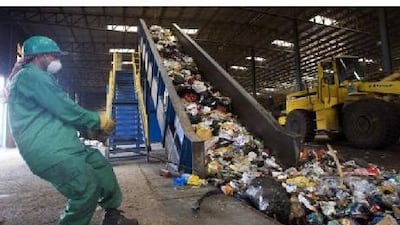A campaign is under way to discourage Middle East companies from "greenwashing", or making deceptive claims of environmental responsibility.
"Greenwashing" - a combination of "green" and "whitewash" - describes the use of marketing and public relations to give the false impression that a company or product is environmentally friendly.
Examples include a disproportionate focus on supposedly sustainable activities in marketing campaigns, or the use of deliberately misleading and vague terms such as "recyclable" and "natural".
InterfaceFLOR, a manufacturer of environmentally responsible floor coverings, launched a "Let's Be Clear" campaign in the Middle East to discourage companies from employing these deceptive tactics.
An online glossary of greenwashing terms has been published as part of the campaign.
Lindsey Parnell, the president and chief executive of InterfaceFLOR in Europe, the Middle East, Africa and India, said use of the word "recyclable" in promotional materials by some companies was particularly deceptive.
"All that is is a theoretical claim that a product could be recycled in the future. But when consumers see the word 'recyclable', they assume it's been recycled," said Mr Parnell.
"What I object to is when that word is used in the context that makes it so easy to confuse it."
InterfaceFLOR, which has been operating in the Middle East for more than 30 years, says it "aims to be the world's first fully sustainable company by 2020". It offers environmental reports on its products and has won several awards for sustainability.
But Mr Parnell said that if companies continued to greenwash, it would devalue genuine attempts to become more environmentally friendly. "Sooner or later, customers are going to realise and get very cynical," he said. "The word 'eco' is starting to become cliched. It's 'eco' this, 'eco' that. You can use the word 'eco' as much as you like, with very little substantiation to it. There's such overuse that there's the danger of it turning into a farce."
Mr Parnell declined to name any specific Middle East company guilty of greenwashing.
There are some examples of better practice on environmental issues in the Middle East, said Hermann Behrens, the chief executive of The Brand Union Middle East, a consultancy based in Dubai.
A recycling campaign launched by the Dubai property developer Emaar was more modest in its scope, said Mr Behrens.
"I've actually been quite impressed by things done by companies like Emaar, setting up recycling schemes. They didn't shout from the hills," he said. But in general, there is "a lot more talk than actual delivery" when it comes to environmental responsibility, said Mr Behrens.
"In time, what will happen is that the people who are talking a lot and doing little will be discovered. It will be very hard for them to recover their reputation," he said. "Get your environmental policy in place and when you are actually performing, then you can talk about it."
Dr Lance de Masi, the president of the UAE chapter of the International Advertising Association (IAA) and president of the American University in Dubai, said the issue of greenwashing has not been looked into by the IAA in this market.
However, he said regulations could become more comprehensive with increasing awareness of environmental issues.
"Typically, on dimensions such as 'green', things tighten up as regulations gain experience, and knowledge in the field increases in sophistication," said Dr de Masi.
"The journey I suspect we will travel here is very similar to the one we have travelled regarding claims such as 'low fat'."

